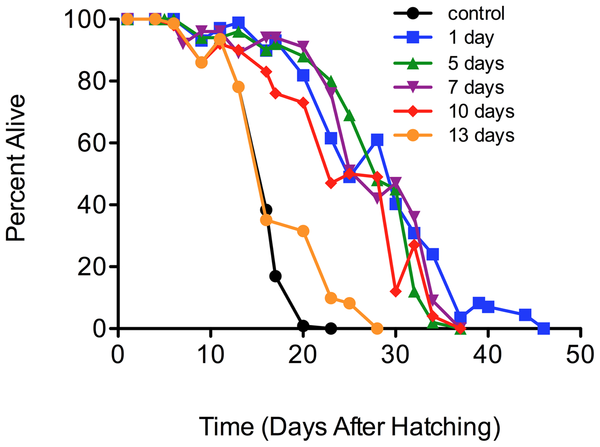Minuscule amounts of ethanol, the type of alcohol found in alcoholic beverages, has been shown to more than double the life span of Caenorhabditis elegans - though just why is still unclear, so don't get out the Jim Beam just yet. Plus, high concentrations have been linked to numerous detrimental neurological effects too many times for that to be overthrown any time soon.
The worms are found throughout the world in soil, where they eat bacteria. They grow from an egg to an adult in just a few days and normally live for about 15 days. They can survive with nothing to eat for roughly 10 to 12 days but the study showed tiny amounts of ethanol can make them survive 20 to 40 days.
The researchers behind the finding set out to test the effect of cholesterol on worms - cholesterol is a big area of research because it has been both vilified and extolled based on studies over the last few decades; we need it in our membranes but it can be dangerous in our bloodstream. They fed the worms cholesterol and the worms lived longer - due to the cholesterol, they assumed. But in controlling for that they noted the cholesterol was dissolved in ethanol, a common solvent, that was diluted 1,000-fold.

Ethanol added to M9 medium up to 10 days post-hatching extends lifespan of arrested wild-type L1 larvae. Wild-type L1 larvae (70,000) were isolated as described in Figure 1 and were transferred to 70 ml of M9 medium supplemented with ethanol (4 mM) after 1, 5, 7, 10 and 13 days of incubation under starvation conditions in M9 medium at 20°C and 160 rpm. Survival was scored every 48 hours until all larvae were dead. Mantel-Cox logrank analyses indicated that the control was significantly different from the 1, 5, 7, and 10 day samples (p<0.0001) and the 13 day sample (p = 0.01). Credit: See citation
"It's just a solvent, but it turns out the solvent was having the longevity effect," said Steven Clarke, a UCLA professor of chemistry and biochemistry and the senior author of the study. "The cholesterol did nothing. We found that not only does ethanol work at a 1-to-1,000 dilution, it works at a 1-to-20,000 dilution. That tiny bit shouldn't have made any difference, but it turns out it can be so beneficial.
"The concentrations correspond to a tablespoon of ethanol in a bathtub full of water or the alcohol in one beer diluted into a hundred gallons of water." Fortunately that is far too much to make homeopathy cranks feel vindicated selling magic water. The question remains, how does such little ethanol have such an effect on longevity?
"We don't know all the answers," Clarke acknowledged. "It's possible there is a trivial explanation, but I don't think that's the case. We know that if we increase the ethanol concentration, they do not live longer. This extremely low level is the maximum that is beneficial for them."
They know more is not better. The scientists found that when they raised the ethanol level by a factor of 80, it did not increase the life span of the worms. Now they need to identify the mechanism that extends the worms' life span. About half the genes in the worms have human counterparts, so if the researchers can identify a gene that extends the life of the worm, that may have implications for human aging.
"We show that very low doses of ethanol can be a worm 'lifesaver' under starvation stress conditions," said co-author Shilpi Khare, postdoctoral fellow at the Genomics Institute of the Novartis Research Foundation in San Diego. "While the mechanism of action is still not clearly understood, our evidence indicates that these 1 millimeter–long roundworms could be utilizing ethanol directly as a precursor for biosynthesis of high-energy metabolic intermediates or indirectly as a signal to extend life span. These findings could potentially aid researchers in determining how human physiology is altered to induce cardio-protective and other beneficial effects in response to low alcohol consumption."
Clarke's laboratory identified the first protein-repair enzyme in the early 1980s, and his research has shown that repairing proteins is important to cells. In the current study, the biochemists reported that life span is significantly reduced under stress conditions in larval worms that lack this repair enzyme. (More than 150 enzymes are involved in repairing DNA damage, and about a dozen protein-repair enzymes have been identified.)
"Our molecules live for only weeks or months," Clarke said. "If we want to live long lives, we have to outlive our molecules. The way we do that is with enzymes that repair our DNA — and with proteins, a combination of replacement and repair."
Citation: Castro PV, Khare S, Young BD, Clarke SG (2012) Caenorhabditis elegans Battling Starvation Stress: Low Levels of Ethanol Prolong Lifespan in L1 Larvae. PLoS ONE 7(1): e29984. doi:10.1371/journal.pone.0029984






Comments